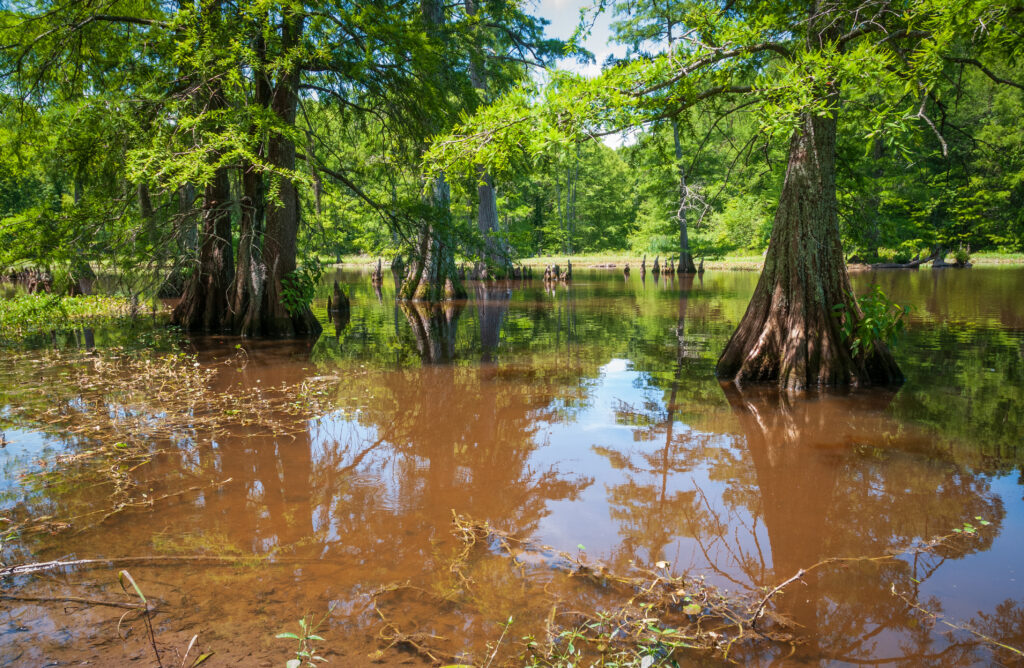The Mississippi Forest Carbon Initiative demonstrates how innovative forest management practices can contribute to significant climate and community benefits. Managed collaboratively by the Indian Land Tenure Foundation, National Indian Carbon Coalition, and the Mississippi Band of Choctaw Indians, this project transforms 25,230 acres of forestland in East Central Mississippi into a model of sustainability.
By prioritizing carbon sequestration and biodiversity, the project mitigates greenhouse gas emissions and conserves vital forest resources. Management activities focus on sustainable forestry practices, minimizing timber harvesting while allowing natural growth and fostering diverse ecosystems.
Through these efforts, the project sequesters significant levels of CO₂, reducing emissions and enhancing resilience against climate change. Its emphasis on ecological integrity and cultural heritage ensures benefits that extend well beyond the project boundary.
ACR716
ACR Registered
25,230 acres
East Central Mississippi, USA

Forest Carbon – Improved Forest Management
100,268 tCO2e

20 years – 12/03/2020 – 12/02/2040
Conservation of forest resources, local employment, and cultural preservation.
The project has a strong commitment to environmental and sustainable development that benefit local communities through the following contributions:
ENVIRONMENT
The initiative enhances forest health through sustainable management techniques that support diverse habitats and improve carbon storage. Management includes removing invasive species, fostering multi-aged forest stands, and regenerating native tree species like loblolly pine and hardwoods. These practices ensure long-term ecosystem integrity while combating climate change.
COMMUNITY
Cultural heritage and environmental stewardship are at the heart of the initiative. By integrating forest management with cultural values, the project preserves tribal traditions and ensures community involvement. The sustainable practices adopted reduce risks from erosion, improve air and water quality, and enhance the overall environment for nearby residents.
EMPLOYMENT
The project bolsters local economies by creating employment opportunities in forest management, monitoring, and conservation activities. By aligning with tribal values and ecological goals, the initiative empowers communities while promoting sustainable economic growth.
Through this partnership, the Mississippi Forest Carbon Initiative aligns with global sustainability goals, setting a precedent for climate-focused, community-driven forest management.



GOAL 3 – Good Health and Well-being

GOAL 13 – Climate Action

GOAL 6 – Clean Water and Sanitation

GOAL 15 – Life on Land

GOAL 9 – Industry, Innovation, and Infrastructure
One Tribe enables businesses to be more sustainable by funding rainforest protection projects that store carbon from being released into the atmosphere. By enabling customers to protect rainforest when they shop online we also empowers consumers to drive positive change
One Tribe is a Climate Action Platform enabling businesses and their customers to make a positive environmental impact.



Eric currently works as an independent consultant at the intersection of nature and climate, focused on catalysing market and non-market solutions to drive the just transition.
He previously was Head of Product at Earthshot Labs, supporting nature conservation and restoration projects across the global south secure project finance. Prior to Earthshot Labs, Eric led nature-based carbon project development for Gorongosa National Park in Mozambique and founded the Carbon Cooperative, a global alliance of leading nature conservation and restoration practitioners exploring carbon finance. After serving in the Peace Corps in Mozambique out of university, he spent much of his 20s working in community-based conservation and ecosystem restoration efforts in Sub-Saharan Africa interspersed with two startup ventures as co-founder and CEO of a mental health tech startup and COO of a sustainable coffee company. Eric has a dual Masters in Environmental Engineering and Environmental Policy from Stanford University where he was a NSF Graduate Research Fellow and a BS in Environmental Engineering from Tufts University.
Alan is a risk management thought-leader, superconnector, and FinTech pioneer. His mission is to enable an Earth Positive economy which includes nature in global accounting systems.
Alan is Founder of Generation Blue, a venture studio dedicated to planetary game changers powered by exponential technologies. Previously, Alan established Natural Capital Markets at Lykke AG, pioneering blockchain based forestry and carbon backed tokens. Alan has over two decades of risk management experience advising global financial institutions, and was a founding member of the RiskMetrics Group, a JPMorgan spin-off. Alan is an investor and advisor to regenerative impact ventures, including TreeBuddy.Earth, Regenativ, and Vlinder Climate.
Lori Whitecalf made history when she became the first woman to be elected Chief of Sweetgrass First Nation in 2011. She served three terms of office from 2011-2017.
Lori took a two-year hiatus from leadership to expand the family ranch and serve as the FSIN Senior Industry Liaison. She was re-elected on November 29. 2019 and again on November 30, 2021, as Chief of Sweetgrass. Chief Whitecalf practises a traditional lifestyle of hunting, fishing and gathering. She currently sits on the following boards: Saskatchewan Indian Institute of Technology, FSIN Lands and Resource Commission, Battle River Treaty 6 Health Centre and Battleford Agency Tribal Chiefs Executive Council, FSIN Women’s Commission.
Tina is the Chief Business Officer for MLTC Industrial Investments, the Economic Development arm of the Meadow Lake Tribal Council. She has a diverse background of experience. Having spent 15 years as a municipal Chief Operating Officer, 20 years involved in Saskatchewan’s Health Authority Board Keewatin Yatthe and 9 years with Northern Lights Board of Education.
She continues as a Board Member with Beaver River Community Futures supporting small business development in her home region. Tina brings a wealth of experience in a variety of fields and many connections to the Indigenous communities of Northern Saskatchewan. In addition Tina holds a BA Advanced from the U of S, a Certificate in Local Government Authority from the U of R and is certified as a Professional Economic Developer for Saskatchewan and a certified Technician Aboriginal Economic Developer (TAED).
Tootoosis’ career spans 40+ years in HRM, political leadership, and Indigenous economic development, as a dedicated bridge builder and advocate for Indigenous causes.
As a key member of the Saskatoon Regional Economic Development Authority (SREDA) team since 2021, he develops strategies for the Truth and Reconciliation Commission final report and Call to Action #92.
He is a graduate of the First Nations University of Canada and a certified Professional Aboriginal Economic Developer. Spearheading various community initiatives while serving as a Chair of the SIEDN while directing ILDII and WIBF. Founder of MGT Consulting Tootoosis is based in Saskatoon, Treaty Six Territory.
Cy Standing (Wakanya Najin in Dakota) has a long and distinguished career including serving overseas as an Electronics Technician in the Royal Canadian Air Force, former Chief of Wahpeton Dakota Nation, former Vice Chief of the Federation of Saskatchewan Indigenous Nations (FSIN), past Executive Director of Community Development Branch of the Department of Northern Saskatchewan as well as an Order in Council appointment to the Federal Parole Board.
Mr. Standing has served as a Director on many Profit and Non-Profit Corporate Boards, including serving as a Director for Affinity Credit Union with assets of over six billion dollars as well as IMI Brokerage and Wanuskewin and is currently a member of the One Tribe Indigenous Carbon Board.